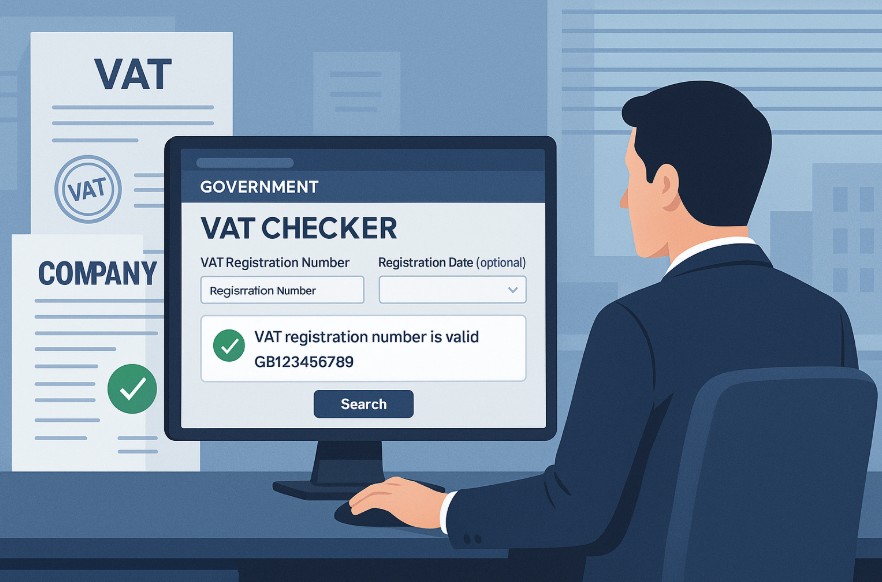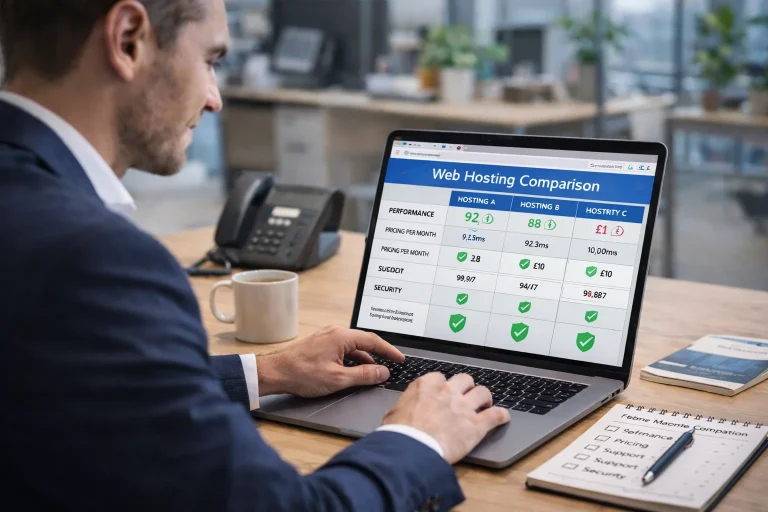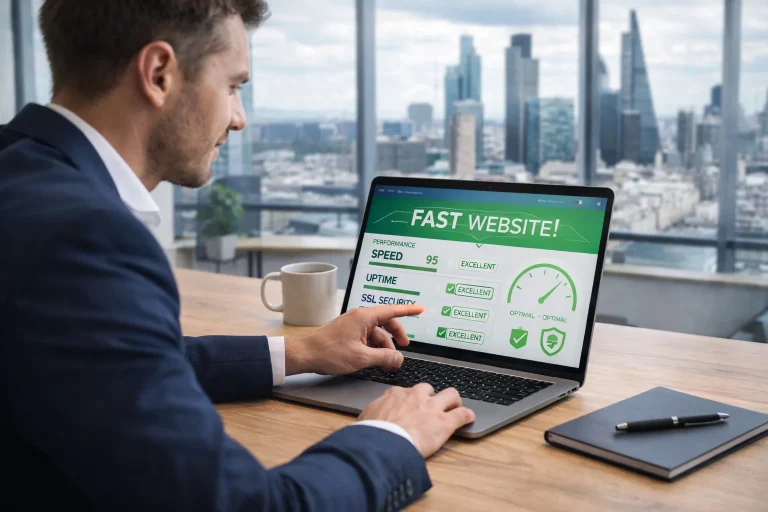Value Added Tax (VAT) is a crucial part of business transactions in the UK. Ensuring that a company is VAT registered can help you verify its legitimacy and maintain compliance with HMRC regulations.
Whether you are a business owner, supplier, or consumer, understanding how to check if a company is registered for VAT is essential. This process is straightforward, thanks to online tools provided by HMRC and the European VAT Information Exchange System (VIES).
In this article, we will walk you through everything you need to know to confidently verify VAT registration for companies operating in the UK.
What is VAT Registration?
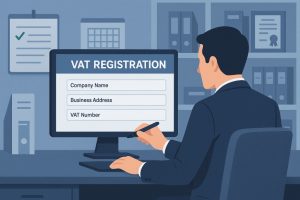
VAT Registration is the process by which businesses in the UK become recognized by HMRC for collecting and paying VAT. Any business with a taxable turnover that exceeds the VAT threshold of £85,000 is legally required to register for VAT. However, businesses with a turnover below this amount may also choose to register voluntarily to reclaim VAT on their expenses.
When a business registers for VAT, it is assigned a unique VAT registration number by HMRC. This number allows it to charge VAT on its products and services and submit VAT returns periodically.
Once registered, businesses are obligated to display their VAT number on all invoices and official documentation. This transparency ensures that VAT is properly accounted for and can be reclaimed by other VAT-registered businesses.
What Does a VAT Number Look Like?
A VAT Registration Number in the UK is a unique code assigned to each business that registers for VAT. Its format varies slightly depending on the region:
- For businesses in England, Scotland, and Wales, the VAT number begins with “GB” followed by nine numerical digits. An example would be GB123456789.
- For companies based in Northern Ireland, the VAT number starts with “XI” instead of “GB”. An example would be XI123456789.
This number is used on invoices, receipts, and other official documentation to identify the business as VAT registered. It is also essential for cross-border transactions within the European Union, as it facilitates VAT processing through the VAT Information Exchange System (VIES). Always check for this number when dealing with new suppliers or partners to ensure their VAT legitimacy.
Why is VAT Registration Important for a Company?
VAT registration is not just a legal requirement; it also brings several key benefits to businesses:
- Legal Compliance: Companies with taxable turnover above the threshold must register for VAT to comply with HMRC regulations.
- Trust and Credibility: A VAT-registered business is often seen as more established and trustworthy.
- VAT Reclaim: Registered businesses can reclaim VAT paid on eligible business expenses, reducing overall costs.
- Transparency in Transactions: Displaying a VAT number on invoices provides clarity and helps avoid disputes over tax-related issues.
- Avoiding Penalties: Failure to register when required can lead to fines and penalties from HMRC.
Additionally, VAT registration can streamline business operations, making it easier to manage transactions with suppliers and clients who are also VAT registered. This ensures smoother trade and better compliance with tax laws.
How to Check if a Company is Registered for VAT?
Verifying if a company is registered for VAT in the UK is a crucial step for ensuring legal compliance and protecting your business from fraudulent activities.
Fortunately, the process is straightforward and can be done using multiple methods. Below are the main ways to check if a business is VAT registered:
1. Use the HMRC Online VAT Number Checker
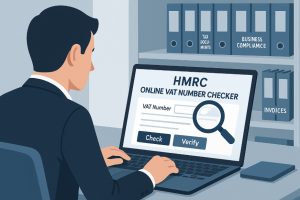
The most efficient method to confirm a company’s VAT registration is by using the HMRC VAT Checker. This online tool, accessible 24/7, allows you to enter the VAT number of the business you want to verify.
If the number is valid, the system will display the company’s registered name and address, ensuring that the details match the business you are dealing with. This verification process is free of charge and provides instant results, making it a convenient choice for quick checks.
2. Call the HMRC VAT Helpline
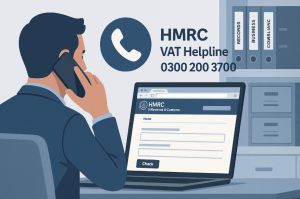
If you prefer offline verification or need additional assistance, you can call the HMRC VAT Helpline at 0300 200 3700. When you call, be prepared to provide the VAT number and your business details for verification purposes.
An HMRC representative will confirm whether the VAT number is valid and provide you with the registered business name and address if it is. This method is especially useful if you need verbal confirmation or further clarification.
3. Use the European VAT Information Exchange System (VIES)

If you are conducting business with companies in Northern Ireland or across the European Union (EU), you can use the VAT Information Exchange System (VIES).
VIES is an online platform that allows you to check VAT numbers for cross-border transactions within the EU. Simply enter the VAT number and select the appropriate country, and the system will instantly confirm whether the VAT number is valid.
4. Verify Through Invoices and Business Documents
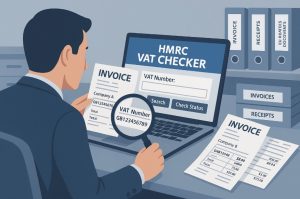
Another effective method to confirm VAT registration is by examining the business’s invoices, receipts, and other official documents. Most VAT-registered companies are required to display their VAT number on all invoices and official paperwork.
Cross-checking this information with the HMRC VAT Checker can help you validate its authenticity. If there are discrepancies, it may indicate potential fraud or clerical errors that need to be addressed.
Using these four reliable methods helps protect your business from fraudulent claims and ensures compliance with UK VAT regulations. Always verify a VAT number before entering into large transactions to safeguard your financial interests.
Why Do You Need to Check a VAT Registration Status?
Ensuring that a company is VAT registered is critical for several important reasons:
- Preventing Fraud: Verifying a company’s VAT status protects you from fraudulent activities where businesses may charge VAT without proper registration.
- Reclaiming VAT: To reclaim VAT on your business expenses, you must confirm that the company you are purchasing from is VAT registered.
- Legal Compliance: HMRC mandates proper VAT invoicing. Dealing with non-registered businesses that charge VAT can lead to legal consequences.
- Accurate Accounting: Knowing the VAT status ensures that you are invoicing correctly and maintaining proper financial records.
Key Benefits of Checking VAT Status
- Avoid paying VAT to non-registered companies.
- Ensure valid VAT reclaims during tax submissions.
- Detect fraudulent VAT claims early.
- Maintain compliance with UK tax regulations.
Consistently checking VAT registration helps avoid legal issues and financial losses during transactions.
What to Do if a Company is Not VAT Registered?
If a company is not VAT registered, it means it is not legally permitted to charge VAT on its goods or services. This can impact your business transactions, especially if you are expecting to reclaim VAT. Here’s what you need to do if you find that a company is not VAT registered:
Confirm the VAT Number
Before making any assumptions, double-check the VAT number using the HMRC VAT Checker or the VIES platform if the company is based in the EU.
Sometimes, errors occur due to incorrect typing or outdated VAT information. It is crucial to validate this number directly through official channels.
Contact the Business for Clarification
If the number is not valid, the next step is to contact the business directly. Politely ask them to confirm their VAT registration status and provide the correct VAT number if available. Sometimes businesses may have recently registered, and the information may not be updated online yet.
Request an Updated Invoice
If the business insists it is VAT registered but you cannot verify it, ask for an updated invoice that includes the correct VAT number. This is important if you plan to reclaim VAT on your business purchases.
Report to HMRC if Fraud is Suspected
If the company continues to charge VAT without valid registration or provides misleading information, you should report this to HMRC.
Charging VAT without registration is considered fraudulent, and HMRC takes strict action against such violations. You can report potential fraud through the HMRC Fraud Hotline or their online reporting platform.
Reconsider Business Transactions
If a company cannot validate its VAT status, you may want to reconsider doing business with them, especially for large transactions. Working with non-registered entities can affect your ability to reclaim VAT and may expose you to legal risks.
Taking these steps not only ensures compliance with tax regulations but also protects your business from potential legal issues and financial losses.
Can a Business Operate Without VAT Registration?
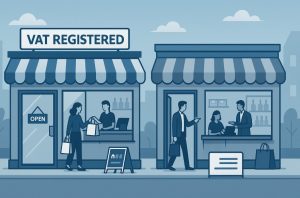
Yes, a business can legally operate without VAT registration if its annual taxable turnover is below HMRC’s threshold of £85,000. In such cases, the business doesn’t charge VAT on sales or reclaim VAT on purchases. This setup can benefit small businesses aiming to keep prices competitive and operating costs lower.
Despite this, many small businesses voluntarily register for VAT to boost their professional image, reclaim VAT on business expenses, and prepare for potential future growth. Being VAT registered can also improve relationships with larger, VAT-registered clients.
However, not being registered may limit opportunities, especially when working with VAT-registered businesses that prefer reclaiming VAT. Since unregistered businesses don’t charge VAT, their clients can’t claim it back, which may be a disadvantage.
In summary, while VAT registration is not mandatory below the threshold, businesses should weigh the benefits and limitations carefully based on their goals and customer relationships.
Who is Exempt from VAT Registration?
In the UK, not every business needs to register for VAT. Some are exempt due to the nature of their services or their turnover. Knowing who qualifies for exemption can help avoid unnecessary paperwork and costs.
Types of VAT Exempt Businesses
- Low-Turnover Businesses: Those earning under £85,000 annually aren’t required to register but may voluntarily choose VAT registration for benefits.
- Charitable Organisations: Certain charity sales and events are VAT-exempt, and charities may receive helpful VAT relief schemes.
- Educational Services: Private tuition, university courses, and vocational training are VAT-free under current UK tax legislation.
- Healthcare Services: Medical services from professionals and some health products are VAT exempt under healthcare tax rules.
- Financial and Insurance Services: Banking, loans, insurance, and similar services are VAT exempt in most financial transactions.
- Property and Land Transactions: Residential sales, long-term leases, and similar property dealings are often fully VAT exempt categories.
These exemptions mean affected businesses don’t charge VAT or reclaim it. This status helps keep costs low for consumers and ensures smoother transactions across essential services.
Conclusion
Verifying if a company is registered for VAT is an important step in maintaining legal compliance and protecting your business transactions.
By using reliable tools such as the HMRC VAT Checker and the VIES platform, you can easily confirm VAT registration status, ensuring that the companies you deal with are legitimate and compliant.
This not only helps prevent fraud but also ensures that you can reclaim VAT correctly on your business purchases. Whether you are engaging with local suppliers, cross-border partners, or new business contacts, always make VAT verification a routine part of your due diligence.
This proactive step safeguards your interests and strengthens business credibility, allowing for smooth and transparent transactions.
FAQs About VAT Registration Check
How often should VAT registration status be checked?
It is recommended to check the VAT registration status periodically, especially before entering into major business transactions to ensure compliance. Regular checks can help you avoid issues with HMRC and prevent fraudulent activities.
Can I check the VAT status of sole traders and freelancers?
Yes, if a sole trader or freelancer is VAT registered, their VAT number can be verified using the HMRC online checker. Their VAT status is public information once registered.
What happens if I trade with a company that is not VAT registered?
If you trade with a company that is not VAT registered, they cannot legally charge you VAT. You also won’t be able to reclaim VAT on your purchases from them.
Is there a cost associated with checking a VAT number online?
No, there is no cost for checking a VAT number online. HMRC’s VAT Checker and the VIES platform are both free to use for verification.
Can I access VAT registration details for companies outside the UK?
Yes, you can use the VIES system to check VAT numbers for companies registered in EU member states, including Northern Ireland. This platform allows you to confirm if the VAT number is valid.
How long does it take for a new VAT registration to appear online?
Once a company registers for VAT, it typically takes a few weeks for their details to appear online in the HMRC database. During this time, they may still issue VAT invoices.
Are there penalties for using an invalid VAT number?
Yes, if you use an invalid VAT number, you may face issues with VAT reclaims and potential fines from HMRC for incorrect tax filings. It’s crucial to verify VAT numbers to avoid these risks.

